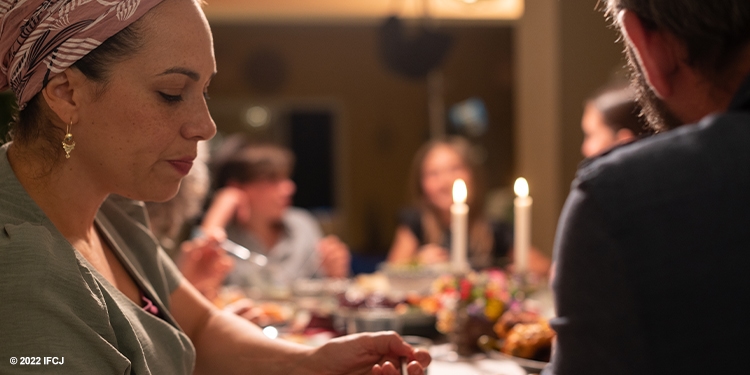A Place of Atonement
Yael Eckstein | January 2, 2023

There was a wooden altar three cubits high and two cubits square; its corners, its base and its sides were of wood. The man said to me, “This is the table that is before the LORD.” – Ezekiel 41:22
One of the founding principles of the International Fellowship of Christians and Jews is God’s eternal promise He made to Abraham in Genesis 12:3, “I will bless those who bless you.” This is one of 12 devotions exploring the concept of blessing, barak, which is so important to both Christians and Jews.
Tucked away in a corner of Jerusalem lives an amazing family. For 30 years now, Rabbi Mordechai and his wife Henny Machlis, originally from New York, have opened their home every Sabbath. That means everyone is welcome to share the family’s Sabbath meals on Friday night and Saturday.
And everyone means anyone — Jews, non-Jews, young and old, tourists and students, and especially the homeless, lonely, and poor. The Machlis family generally hosts more than 200 people every single weekend. Through their warmth and kindness, the Machlis’ are changing the world — one guest at a time.
Their generosity and hospitality have a spiritual factor, as well.
A question I frequently am asked by Christians is how Jews gain atonement for our sins now that the Temple has been gone for thousands of years, and with it the sacrifices that were offered there for our sins.
While there is no substitute for sacrifices, the Jewish sages suggest a number of alternative paths to atonement such as prayer, fasting, and one other option, which is difficult to understand. The sages teach that “as long as the Temple stood, the altar atoned for Israel, but now a man’s table atones for him.”
A Place of Atonement
Where would the sages get such an idea? The source for this idea is a verse where the prophet Ezekiel was shown a vision of the future Third Temple. We read, “There was a wooden altar three cubits high and two cubits square; its corners, its base and its sides were of wood. The man said to me, ‘This is the table that is before the LORD.’”
The item in the vision is first called an “altar.” Then, later in the verse it is called a “table.” Did Ezekiel see an altar or a table? The Temple contained both. The altar was the place for atonement sacrifices. The table in the Temple was where the “showbreads” were displayed, representing God’s blessings of abundance. Commentaries on the verse disagree. The verse is unclear.
But that is exactly the point. Our tables, the place where we enjoy God’s abundant blessings, are also meant to be used as offerings to Him. And the way we do that is by sharing our blessings with those who need a warm meal and a safe home, as well as our love and friendship. When we use our table in service of others, it becomes a place of atonement.
When our table becomes an altar, when we give an offering to the needy from the abundance that God has blessed us with, we, in turn, bring more blessing and atonement into our lives.
Your Turn:
Bring blessing to your life by sharing your abundance with others. Use your table as an altar of offering to God.
